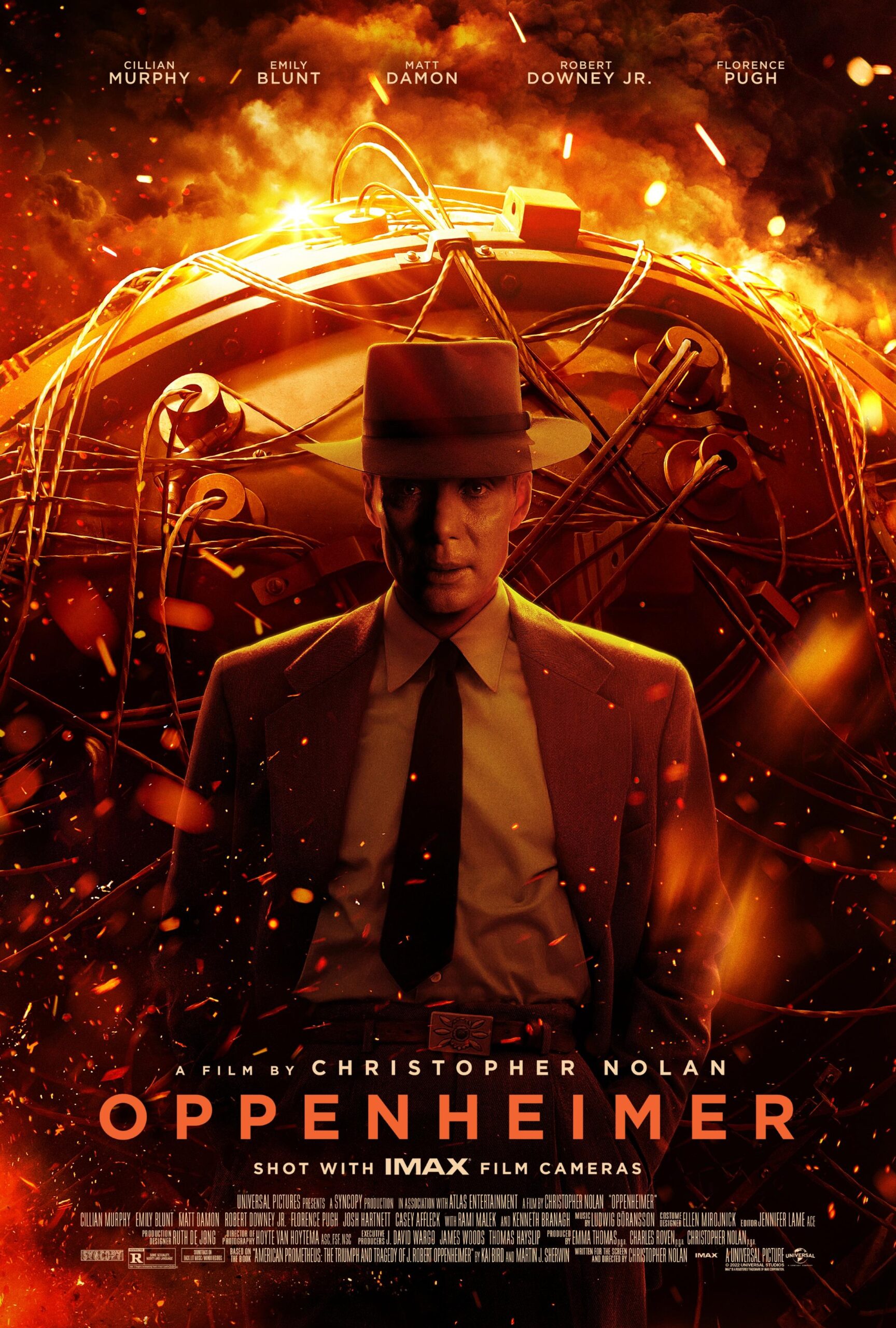Photo credits: IMDb and Universal Pictures
If you had an existential crisis this summer, there’s a good chance you owe it to one of the two films that dominated the box office during the weekend of July 21. “Barbenheimer,” of course, does not need any introduction. It was as omnipresent this summer as the record-breaking heat, wildfire smoke, and lantern flies. These movies about a popular children’s toy and the father of the atomic bomb were talked about by everyone, all the time. The more interesting discussion to be had though, both culturally and intellectually, is not how these two films came to define a summer, but why. Now, I must be honest, I do not envy those who saw both of these movies on the same day. I had initially planned to do so actually, but circumstances precluded me. The feelings and emotions that these movies left me with were so wildly different that I could only imagine my brain would have short-circuited had I seen them back-to-back. Bearing this in mind, allow me to discuss these two films separately, on their own merits, before wrapping it all up at the end. I truly believe this is the only way to do both of these fantastic works of art justice.
I saw “Barbie” (2023) first, and quickly realized upon entering the theater that I had forgotten to wear pink, as everyone else seemed to be. Although that made me feel like a bit of a dunce, I very quickly understood that I was watching a very special movie. “Barbie” is, undoubtedly, a feminist film first and foremost. Despite the fact that there are some people who have chosen to write it off for that reason, it is so much more. Too many people today conflate feminist messages as being somehow anti-men. In reality, two things can be true at once, and to take the stance that a feminist film must be inherently spiteful towards men is ignorant and unfounded. “Barbie” observes modern womens’ issues through the lens of the patriarchy, with the titular character serving as the conduit for these bigger ideas about society as a whole. This is not to discredit the writing or the performance; Barbie’s character arc is delightfully compelling and Margot Robbie’s portrayal is brilliant. This is all merely to say that the themes being played with here are endemic to our culture, rather than “Barbie” being strictly a character study. Upon entering the real world and experiencing the patriarchy, as opposed to the matriarchy of Barbieland, Barbie is shocked by the way we do things. This should also be a splash of cold water in the face for the audience too. Is this really how we want our society to function? Women live in a world where paranoia is thrust upon them, in regards to their bodies, attitudes, occupations… essentially every aspect of life. The solution to these issues is where director Greta Gerwig expertly toys around with the dichotomy between women and men under the patriarchy. Enter the Kens, who initially live happily under the matriarchy of Barbie Land. Ryan Gosling delivers one of the most truly funny performances you’re likely to see this year in his role as Ken, as it is quite easy to tell that he had the time of his life playing this character. By looking at the arc of Gosling’s Ken in the film, it is clear that Gerwig is promoting a message of empowerment and unity for both women and men. Upon discovering the patriarchy, Ken feels obligated to fill the role of the “macho man,” developing a severe inferiority complex, rage issues and an admittedly hilarious obsession with horses. Ken begins to believe he can only find happiness in being more powerful and influential than his fellow Kens. This mentality sends him into a depressive state, although he denies those feelings in order to maintain an image of strength. Sound familiar? Despite the film making it such a joy to explore the ludicrous roles forced upon men and women by the patriarchy, these premises are funny because of how real they are. Mental health crises exacerbated or outright caused by the patriarchy are not unfamiliar to us. Rather, they are sadly inseparable from our lives. “Barbie” does, however, offer a solution: unity. The patriarchy is harmful to everyone who lives under it, and we can only break free from its grasp if everyone buys into the abandonment of these antiquated mindsets. When the Barbies and the Kens ultimately recognize the inherent humanity in each other, the simple desire to live free and be loved, they begin building towards a world that is cognizant of the needs of all, rather than only some.

What’s the best way to follow up a delightful movie about dolls? A three hour Christopher Nolan drama biopic about the man who gave humanity the power to destroy itself, of course! “Oppenheimer” (2023) begins with a prophecy: “PROMETHEUS STOLE FIRE FROM THE GODS AND GAVE IT TO MAN. FOR THIS, HE WAS CHAINED TO A ROCK AND TORTURED FOR ETERNITY.” An appropriate introduction to a film that is accordingly chilling and harrowing in its presentation and messaging. J. Robert Oppenheimer, a Jewish physicist from New York, would indeed suffer the aforementioned fate. The central conflict in “Oppenheimer” is an internal one, brought to life by Cillian Murphy’s Oscar-worthy performance. Does Oppenheimer have blood on his hands? Should he bear the burden of giving humanity the power to kill billions indiscriminately? These are heavy, depressing questions that Nolan does not attempt to answer concretely, but merely explore as deeply as possible. It is left up to the audience to place their judgment upon Oppenheimer. Indeed, Oppenheimer volunteered himself to head up the Manhattan Project, but the Germans were already well on their way to making their own atomic bomb. If they had developed the technology first, there was no telling how they might use it. A necessary evil, some might say. Of course, the bomb never had the chance to be used in Europe, following Germany’s surrender in May 1945. Fat Man and Little Boy, two versions of the bomb’s design, would ultimately kill hundreds of thousands of Japanese men, women, and children in August of the same year, effectively ending the conflict in the Pacific Theatre. Oppenheimer would live with this guilt for the rest of his life, but does he reserve that right? He took the credit for the atomic bomb, and he helped choose the targets upon which they’d be dropped. Since I find it disingenuous to leave you with nothing but questions, allow me to offer my take. Oppenheimer cannot be blamed for seizing the opportunity to end the reign of Fascism in Europe, and thus implicitly saving the lives of countless people across the world. Especially as a Jewish man, he knew what German possession of a nuclear arsenal could mean. If it had to be either Nazi Germany or the United States, it was clear at that moment that the world could not let the Fascists prevail.
Unfortunately for Oppenheimer, nuclear proliferation following WWII was not simply a distant fear in the back of his mind, as it became a massive chess piece in the Cold War. For all that he had done as a proud American, Oppenheimer was blackballed by the government for opposing the development of the hydrogen bomb. A victim of McCarthyism, his history of flirting with socialist ideas and supposedly inexplicable change of heart regarding nuclear weapons are used against Oppenheimer to revoke his national security clearance. Nolan is not so subtle in his views on this, in contrast to the ambiguities used throughout the rest of the film. Oppenheimer was a man who did what he thought he had to in order to save lives, but when he opposed further expansion of the nuclear program, he presented a roadblock. Without regard for his devotion to his country, he was thrown under the bus for not falling in line. A stark reminder of what happens to many who choose to oppose or resist the will of those in power.
Despite my long-windedness, these investigations do not nearly represent a satisfactorily comprehensive discussion of the ideas and questions these two films raise. As is clearly apparent after viewing these movies, the “Barbenheimer” phenomena lived up to the hype in almost every way. That is two massive, landmark achievements of cinema that very well could not be any more different from one another. Undoubtedly, this cultural craze represents an unforgettable moment in our collective memory. It has not been since the pre-pandemic days that people have been so excited to go to the theaters. Even more significant is that this was not for a Marvel or Star Wars movie (no discredit to them), but for a film about a children’s toy, and one about a smart guy who did math in the 40s. “Barbenheimer” almost certainly rose to prominence because it is, on its surface level, a funny proposition. But in the interest of a cheaply emotional and pseudo-intellectual conclusion, allow me to compress this down to a more personal level. Being alive, particularly in the past eight years or so, has been an absolute roller-coaster ride. We’ve been through a pandemic, two razor-thin elections, numerous instances of climate disaster and so much more. We all have our good days, but we’ve all certainly had our days that… could be better. Bearing this in mind, as outwardly ridiculous and humorous it may seem to marathon “Barbie” and “Oppenheimer,” is there anything more human than this experience? To collectively, with family, friends and all our fellow moviegoers, experience such a dramatic emotional whiplash that starts conversations that need to be had? When the laughs and happy tears of “Barbie” give way to the stiffening shock of hearing Oppenheimer’s omen that he has doomed humanity, or vice versa, we are all reminded what it’s like to be human. It’s wonderful, and it’s heart-breaking. It’s hilarious, but also terrifying. Love, with just as much resentment. This past summer, we had this experience together. It is exactly as such that we must face the world and begin to answer the questions these films ask us. We live lives of confusion and uncertainty, but maybe, with a shoulder or two to lean on and an open set of ears, we can all make this world just a little bit better for each other.
Carlo Constantine is a second-year Political Science major. CC1031591@wcupa.edu

